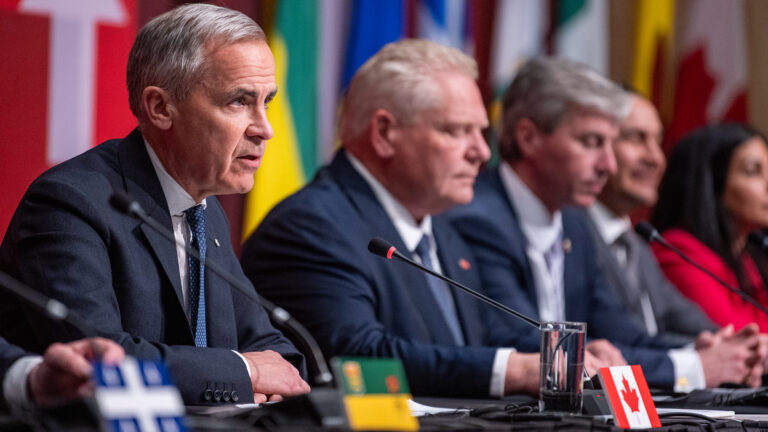Federalism and the Crisis of Health Care
Since the COVID-19 pandemic, the state of health care in Canada has been even more central to federal-provincial relations than usual. To respond to growing concerns about a lack of resources in the provinces, a new federal-provincial agreement on health care transfers was reached in winter 2023. Yet, even with this additional funding and with provinces like Alberta and Quebec moving forward with important reforms, the perception of health care systems across the country is worsening.
In its last two editions, the annual Confederation of Tomorrow Survey of Canadians gauged perceptions of provincial health care systems by asking respondents to choose between three descriptions of the system in their province. The options were: (1) On the whole the system works pretty well, and only minor changes are necessary; (2) There are some good things in our health care system, but fundamental changes are needed; and, (3) Our health system has so much wrong with it that we need to completely rebuild it.
When this question was first posed in 1988, only 5 per cent of respondents chose the last option and 56 per cent thought their provincial system worked well. By 2023, 25 per cent of Canadians considered their provincial health care system to be in crisis and only 15 per cent thought it worked well. And in 2024, it is now 30 per cent of respondents who say their health care system is in crisis, a five-point increase in one year and a long way off from the 5 per cent of 1988.
As Figure 1 shows, since 2016, the perception that the health care system works well has steadily declined, whereas the perception of crisis has steadily increased. However, at 51 per cent, the most popular option remains the second one, which suggests some key changes are needed.
Variation across provinces
The evaluation of the performance of health care systems has worsened in all provinces except in Atlantic Canada. In these four provinces, the proportion of respondents who said their system was in crisis decreased by 3 percentage points between 2023 and 2024. Yet, even with this change, Atlantic Canada still has the highest percentage of residents who believe their health care system is in crisis, with Quebec close behind. What these provinces also have in common is older populations and a comparatively lower GDP per capita.
Nevertheless, the deteriorating perception of health care is evident across all provinces. For instance, in Alberta, which has one of the country’s youngest populations, the proportion of respondents who thought the province’s health care system was in crisis rose from 22 per cent in 2023 to 27 per cent in 2024.
Trust in the health care system
These trends mirror a decline in the perception of access to care, by far the most important predictor of health care performance evaluation, according to a recent study published in Canadian Public Administration.1
The 2023 Confederation of Tomorrow Survey asked: “If you or a member of your family were to get sick and need to see a doctor, how confident are you that you would be able to get treatment from the health care system within a reasonable period of time?” The four possible answers ranged from “very confident” to “not confident at all.” Figure 3 combines the percentage of “very confident” and “somewhat confident” answers and compares them with the “not confident” ones. The 2024 results to the same question demonstrate the declining perception of access to care: in 2023, 40 per cent of respondents were “not confident at all” and in 2024 this proportion rose to 47 per cent.
The variations in the proportion of respondents who lack confidence in accessing care is similar to the perceived crisis across provinces. Confidence decreased by at least four points in all provinces with the exception of the Atlantic region. The biggest change from 2023 to 2024 is a 14-point decrease in confidence in Manitoba.
Who is responsible?
When respondents were asked who they thought was responsible for the problems in health care, the answers were consistent between 2023 and 2024. The proportion of those who believed that management at the provincial level was to blame remained steady at approximately 42 per cent, while 42 per cent of respondents blamed insufficient funding from the federal government.
This relative stability in attributing blame for health care problems came at a time when negotiations between federal and provincial-territorial governments were making headlines, culminating with the 2023 health care transfer agreements. In other words, though the federal government did increase its investment in health care, the additional funding did not change which order of government Canadians held responsible. Interestingly, Canadians who believed the system was in crisis were more likely to blame provincial mismanagement than federal funding, and to demand the federal government hold provincial governments accountable.2
Funding and national standards
The 2023 federal-provincial-territorial agreements can be seen as a response to the perceived crisis of health care, the ensuing public demand for accountability and the perceived causes of the crisis. The federal government highlighted the importance of national standards and the bilateral agreements containing the bulk of additional funding are driven by conditionality. However, support for imposing national standards also decreased from 36 per cent in 2022 to 32 per cent in 2024. In fact, those who believed that provinces should decide how to spend the funding from transfers increased from 45 per cent to 52 per cent.
Further, as a comparison, Figure 6 presents support for national standards regarding child care between 2022 and 2024. Interestingly, support for national standards did not increase in light of the implementation of the federal child care program outside of Quebec, which is funded by a conditional transfer for the development of services. If citizens were to change their mind on the issue of national standards, it should logically be when the federal government successfully creates a popular social program, but this has not been the case in either child care or health care.
The recent Confederation of Tomorrow data suggest that despite federal-provincial-territorial agreements on health care and child care relying on more generous but conditional transfers, the federal government has been unable to convince the provinces, and perhaps more importantly the population, of the pertinence of a national standards-based approach.
It may be time to revisit the idea that social policy expansion must necessarily be implemented through national standards and conditions imposed by the federal government. It is also important to highlight that people increasingly believe their health care system is in crisis and a majority blame provincial management for that. In short, both orders of government have their work cut out for them.
1 Jacques, O., & Perrot, M. (2024). Who’s to blame for the crisis of the healthcare system? Canadian Public Administration, 67(2), 1-17.
2 Jacques, O., & Perrot, M. (2024). Who’s to blame for the crisis of the healthcare system? Canadian Public Administration, 67(2), pp. 1-17.

















